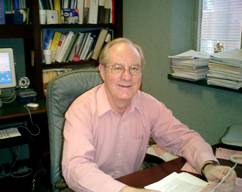Mentorship Program
About the Program

 The goal of this program is to provide younger scientists (newly independent scientists or late stage post‐doctoral fellows) with high quality mentoring by a senior scientist within mucosal immunology. The mentorship will formally last two years and is intended to assist the mentees in the development of their independent scientific programs on all levels, including, for example, grant writing and networking. Click here to apply!
The goal of this program is to provide younger scientists (newly independent scientists or late stage post‐doctoral fellows) with high quality mentoring by a senior scientist within mucosal immunology. The mentorship will formally last two years and is intended to assist the mentees in the development of their independent scientific programs on all levels, including, for example, grant writing and networking. Click here to apply!
Although many universities and institutes have formal mentoring programs, it may be difficult for faculty at smaller or specialized settings to find a mentor with mucosal immunology expertise. External mentoring, outside of the mentee’s institution, will promote networking opportunities. This setup also allows for the discussion of topics that the mentee may not be comfortable having with his/her peers. Guidance and support through this program will allow for the mentee’s successful career and professional advancement in mucosal immunology.
It is expected that each mentee‐mentor pair will establish their own unique relationship. However, a successful SMI Mentoring Program pairing will entail some aspects of grant reviewing, manuscript reviewing and invitation of the mentee for a research seminar.
- The program will provide up to $1,000 travel money to support the mentee’s travel to the mentor’s institution. It is expected these trips will be used for scientific exchange, including informal and formal presentations and grant revision.
- During the program, mentees and mentors will be expected to attend the biennial ICMI or the alternate year MICS event. Registration fees will be paid by SMI for both the mentee and mentor; the mentee and mentor are responsible for other costs associated with attendance. The mentees will present short talks in a SMI Mentoring Program panel. Mentors and mentees will also have an event to network with each other.
- A yearly evaluation will be performed by both the mentee and the mentor and submitted to the SMI Mentoring Program Committee.
Mentor Selection
In pairing a mentee and a mentor several elements will be considered, the most important being familiarity with the main scientific funding organizations of the mentee including grant formats and scientific review panels. Other factors include general geographic area and field of interest. The program will allow applicants to propose up to three mentors for consideration of the SMI Mentoring Program Committee. Prior employment of the mentee by the mentor is not allowed.
Qualifications
Mentees will be newly independent investigators within 5 years of their first independent appointment at a new research institution. Senior post-doctoral fellows (at least 2 years of postdoctoral training at the time of application) or Scientists with other titles (i.e. Research Assistant Professor or Instructor) who may not have independent labs, but are in a similar career stage, are also welcome to apply. Applicants must be SMI members in good standing.
Application
A current SMI membership is a prerequisite for this program. Materials for application include the following:
- Ranked list of three potential mentors with their institution and contact information
- Statement on what you hope to gain from participating in the program (750-word limit)
- Current CV
- Submitted application—apply here
Testimonials
"The SMI Mentoring Program has been a great opportunity. It allowed me to get privileged contact with an established and leading PI in my field, with whom I could exchange and get input in an easy and natural way on both my scientific and career projects."
– Helena Paidassi, CIRI - Centre International de Recherche en Infectiologie
"The SMI mentoring program has given me the opportunity to get specific funding advice on mucosal immunology that isn’t obtainable from mentors at my institution"
– Lauren A. Zenewicz, Ph.D., The University of Oklahoma Health Sciences Center
"I am a newly independent scientist from an under-represented country with limited national research funds. Having a mentor from SMI is an amazing opportunity that not only provides guidance from an experienced scientist but also elevates the quality of research goals that I can aspire to achieve."
– Pablo A. Romagnoli, Ph.D., Instituto Universitario de Ciencias Biomédicas de Córdoba (IUCBC)
Current Pairings
2017–2019 Mentees & Mentors
- Andrea Reboldi, University of Massachusetts Medical Center
Kathy McCoy, University of Calgary - Benjamin Lee, University of Vermont
Nicholas Mantis, New York State Department of Health - David Bernardo Ordiz, Hospital Universitario de la Princesa
William Agace, Lund University - Eduardo Villablanca, Karolinska Institutet
Nadine Cerf-Bensussan, INSERM - Elizabeth Mann, University of Glasgow
Clare Lloyd, Imperial College London
2018–2020 Mentees & Mentors
- Francesca Ronchi, University of Bern Andreas Diefenbach, Charité
Mahima Swamy, University of Dundee Nadine Cerf-Bensussan, INSERM - Rajat Madan, University of Cincinnati
Brian Kelsall, National Institutes of Health - Lucy Jackson Jones, University Edinburgh / Lancaster University
Adriano Rossi, University of Edinburgh - Matthew Hepworth, University of Manchester
Rick Maziels, University of Glasgow - Calum Bain, University of Edinburgh
Dana Philpott, University of Toronto

